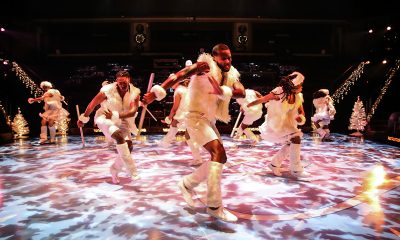Arts & Entertainment
Romance and religion
Gay-themed play explores prickly subjects with humor
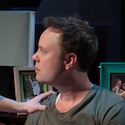
‘Next Fall’
Round House Theatre
Through Feb. 26
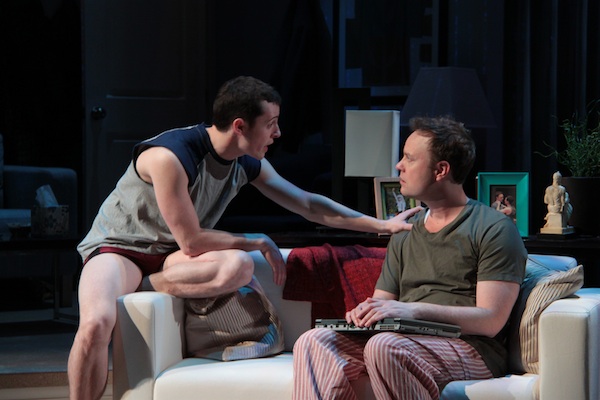
Chris Dinolfo as Luke, left, and Tom Story as Adam in ‘Next Fall’ at Round House Theatre. (Photo by Danisha Crosby; courtesy Round House)
Sex and spirituality — or the lack thereof — intersect in thought-provoking ways in the flawed-but-worthy play ‘Next Fall,” a 2009 piece that’s enjoying a post-Broadway local run at Round House Theatre in Bethesda, Md.
Luke (Chris Dinolfo) and Adam (Tom Story) meet when the former gives the latter the Heimlich maneuver to ease a panic attack at a party. He later admits it was just an excuse to get his arms around Adam, who’s older (he reluctantly admits to 40), a neurotic hypochondriac drifting through life. Luke is young and cute, a promising actor whose career is about to take off. Opposites attract, of course, and a one-night stand turns into a long-term committed relationship.
The premise may sound like a Hollywood screwball comedy, but playwright Geoffrey Nauffts (who’s played Adam in previous productions) soon dives into more serious territory. There’s another serious difference between the two men — Luke’s a devout fundamentalist Christian and Adam’s a committed agnostic. And unlike a typical screwball comedy, Nauffts’ fascinating script focuses not so much on what brings the characters together in the first place, but on what keeps them together over the years.
The play opens in a hospital. Luke has been struck by a taxi and his anxious family and friends keep vigil in the hospital waiting room. They have been summoned by the tightly wound Brandon (Alexander Strain in a somewhat underwritten role), Luke’s estranged friend who’s a thriving real estate mogul who is also struggling with Christianity and homosexuality. Adam’s friend Holly (Dawn Ursula) runs the candle shop where both Luke and Adam work at various times and who searches for meaning (and men) in a variety of New Age activities. Luke’s divorced parents have arrived from Tallahassee, Fla. Arlene (Kathryn Kelley) is fighting her own demons and the ruggedly pious Butch (Kevin Cutts) willfully ignores the signs that his son is gay. As the present-day medical drama unfolds, flashbacks move fluidly through time, tracing how the two men meet, move in together and negotiate the many compromises necessary in any relationship.
Unfortunately, the heavy-handed production at Round House Theatre frequently tramples on Nauffts’ finely wrought structure and delicately crafted language. Where the scenes should flow seamlessly together, director Mark Ramont and his design team stop the action cold after every scene with slow fades, overwrought music and awkward set changes. These painful transitions stop the play in its tracks, leaving the actors to struggle to regain their momentum when the action resumes.
This fumbling treatment also extends to some of the acting. Kelley struggles unsuccessfully with the role of Luke’s troubled hardscrabble mother Arlene who abandoned Luke when he was a toddler. She never finds her way through the complex vocal and emotional shadings of the character, missing the potent combination of desperation and guilt and anger that fuel the character and fighting against the complex rhythms of the dialogue.
Luckily, Story and Dinolfo bring passion and electricity to the central characters. The openly gay actors display an easy physicality in their onstage relationship. We see the deep physical and emotional bonds that pull them together and we also see the tense spiritual doubts that push them apart. Luke desperately and sincerely wishes that Adam could find faith so they can spend eternity together. Adam hates the fact that Luke prays for forgiveness after they have sex and refuses to come out to his parents. Story and Dinolfo make these tensions palpable and draw us into their compelling story.
They also expertly use Nauffts’ rich language to full effect. For all its serious themes and moving drama, “Next Fall” is often funny. Among other things, Nauffts explores the intriguing way humor is used in different situations: as a strategic defense, as a coping mechanism, as a weapon, as seduction, as social lubricant, as a world view. He also depicts spirituality in a sensitive and robust manner, embracing the many ways his characters find their way through an uncertain religious and ethical universe. All of them are on serious spiritual quests, whether they acknowledge it or not, and these issues come naturally to the fore as Luke battles for his life. Nauffts also captures the ebb and flow of the various long-term relationships with nuance and naturalness. It’s a rare play that tells us everything we need to know about the characters yet leaves us wanting more.
Sports
Trans cyclist’s victory sparks outrage in conservative media
Katheryn Phillips is originally from DC

On the heels of UPenn erasing the record of the first openly transgender NCAA Division I All-American swimmer and the U.S. Supreme Court’s decision to tackle bans on trans student-athletes, right wing media is now all hot and bothered about the latest trans woman who won a cycling championship — even though she competed according to the rules.
On Tuesday, 58-year-old Katheryn Phillips finished first in USA Cycling’s Lyons Masters National Championship race for women aged 55-59, with a time of 1:42:10, according to the official results posted by the organization. The record shows her gender as “F” for female.
One second behind Phillips was Julie Peterson, with a time of 1:42:11 — as were three other cyclists: Mary Beth Grier, Andrea Cherniak-Tyson, and Carolyn Maddox.
Peterson, 57, was so outraged, she told Fox News she refused to stand on the podium in second place next to Phillips. Her story was swiftly shared by the New York Post (also owned by Fox’s parent company News Corp.), the Daily Mail, Breitbart, and other conservative media.
Both Peterson and another competitor are accusing USA Cycling of “hiding” that a transgender woman had registered to race.
“It was hidden from us. Katheryn Phillips, KJ’s name, was not on that list. And I checked it up all the way to the point of closure when we couldn’t register online anymore,” Debbie Milne told Fox.
“If I had known, I wouldn’t have spent thousands of dollars in travel and time off work to come and do a race,” Peterson said. Fox welcomed Milne, 56, who finished seventh on Tuesday, to Fox & Friends Thursday morning.
(Video courtesy of Fox News)
Peterson told Fox she did complain to USA Cycling officials prior to the race. Both Milne and Peterson referred to Phillips as a male, and with “he/him” pronouns.
“To be fair to all humans, if we want to say ‘him’ or ‘her,’ he was born a biological male, that is a fact,” Milne said. “And that is the thing that makes it an unfair advantage. Whatever has happened after that is a whole different topic.”
“I said, ‘I don’t want to race against a man,’ and they quickly scolded me and said ‘Oh, you can’t call him a man,’ and I’m like ‘Well, he is a man,’ so I was quickly scolded and corrected that it is a woman and I don’t even know what to say.”
USA Cycling did not respond to the Washington Blade’s emails requesting comment.
Phillips, who goes by Kate and by “KJ,” is a former rugby player with the D.C. Furries, who stated in the comments of a 2024 article published by Zwift Insider that she was the first out trans athlete in the U.S. to compete under the 2004 International Olympic Committee’s guidelines on trans participation.
“When USA Rugby told me about the IOC decision in 2004, I raised my hand to be included. I experience nothing but joy when I play, ride, and race,” Phillips said.
As the Blade has reported, the International Olympic Committee drastically revised those rules in 2021, and in March, Republican lawmakers in D.C. demanded the IOC ban trans female athletes from women’s sporting events altogether.
The Blade also reached out to Phillips for comment but as of press time we have not received a response. She told Zwift Insider in March 2024 she does not let those who disapprove or spread hate impact her performance or her attitude.
“I am unaffected by dissent. I love, I share joy, I am me, and I have been my authentic self for decades,” she said. It’s been reported Phillips came out in 1999, and told Zwift Insider she considers herself a lifelong cyclist.
“I’ve been on a bike for as long as I can remember,” said Phillips. “As kids, my friends and I rode all over town, we were feral kids; no cell phones, no trackers … we just roamed, and nobody got in trouble or hurt bad enough not to ride home … Scrapes/bruises/cuts were not an issue for us. In my teens, I worked for myself as a court/legal messenger, doing all of the work via my bike until I got a car. Raced BMX as a kiddo (when I mowed lawns to cover the race entry fees), I did MTB stuff (non-racing) and Sprint/Olympic Triathlons in my 30’s, and now I’m racing on Zwift, Road/Gravel, and CX in my 50s.”
In the comments section, Phillips made clear she’s not competing to win.
“I don’t do sports for victory, I do it because like many other women, I am an athlete to my core,” she said. “Unlike some, I am not there to WIN, I am there to do my best with the competitors and teammates I have around me trying to do the same…we are in it for the experience. I rejoice in their wins, and a lot of joy is reflected back to me when I have a good day.”
Celebrity News
Nina West’s ‘Sugar in the Tank’ tour comes to Rehoboth Beach
Drag Race’ contestant will be at Clear Space Theater Company on July 6
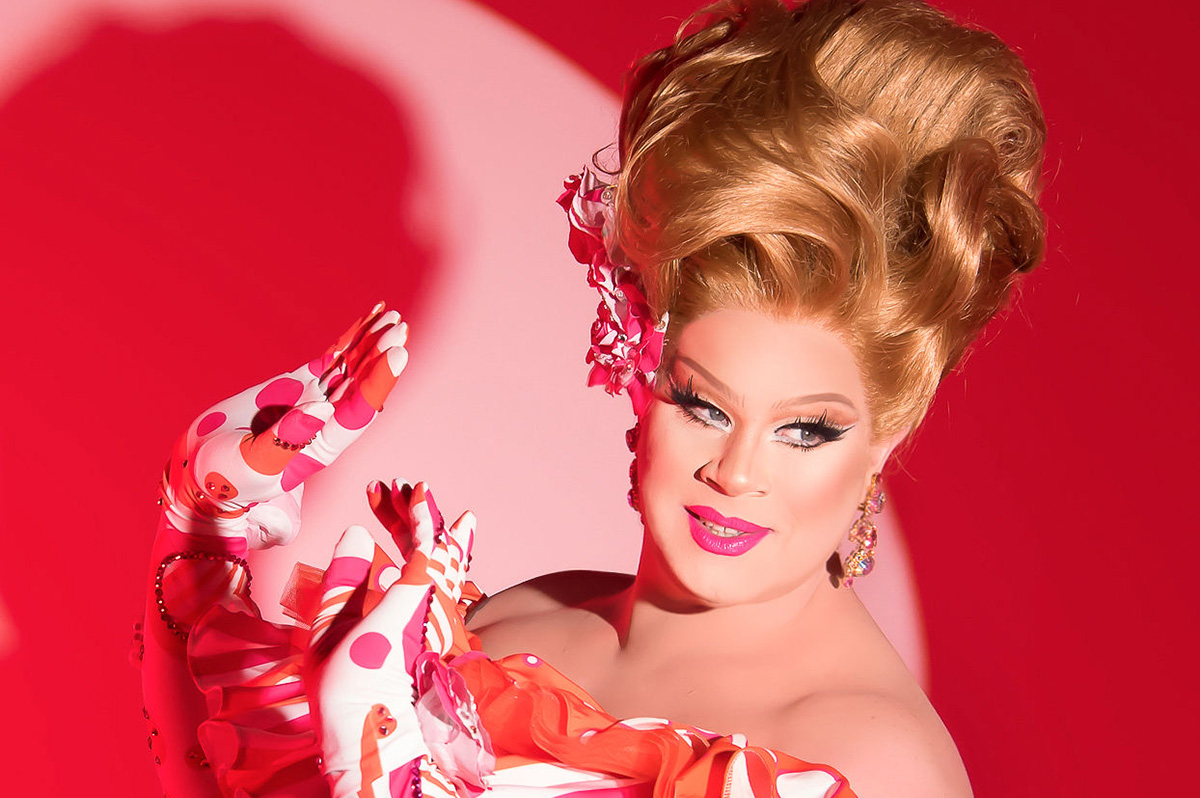
Nina West, a drag queen known for competing on “RuPaul’s Drag Race,” is currently on her ‘Sugar in the Tank’ tour around U.S. cities.
With previous shows in Key West, Fla., New York, and hometown of Columbus, Ohio, the tour is staying put in Provincetown, Mass., from late July to early September. It will make a stop at Clear Space Theater Company in Rehoboth Beach, Del., as part of a summer cabaret series on July 6.
Andrew Levitt has been performing as Nina West for 25 years, who got her rise from starring in “Drag Race” Season 11, where she placed sixth and won Miss Congeniality, a title awarded to the contestant who is regarded as the kindest and most helpful one of that season.
West has toured “Hairspray” on Broadway as Edna Turnblad, starred in a couple of feature films and published a children’s book titled ‘The You Kind of Kind.’
Levitt said he wrote this show in response to attacks from the government towards the LGBTQ community.
“‘Sugar in the Tank’ is a big old gay fabulous summer musical,” Levitt told the Washington Blade. “The show is a response to the darkness that I think has fallen over a lot of people in the country and it’s hopefully trying to bring a little bit of light and a little bit of joy.”
“Sugar in the Tank” is a Southern euphemism for gay, often holding a negative connotation. Levitt said he wanted to “reclaim and embrace” queerness in times when some people want to take that away.
Levitt said he knew he would be traveling to predominantly queer destinations like Key West and Provincetown for these shows and that was always at the forefront of his mind when writing “Sugar in the Tank.”
This will be Levitt’s first time in Rehoboth Beach. Clear Space Theater is considered Delaware’s second-largest professional non-profit theater and the state’s most prolific producer of professional theater. The space seats just 170 patrons and Levitt said he loves the intimacy of a small venue and that it’s his favorite way to do a show.
“Stages like this size are the perfect size for me because it allows for me to really showcase my talents,” Levitt said.
Levitt founded the Nina West Foundation in 2015 to uplift and sustain the central Ohio LGBTQ community, which has raised more than $3 million for various organizations. He said he makes activism part of the entertainment in his career.
“That’s the nuance of what drag is. We can be ridiculous for fun and we can be serious but it’s all wrapped up into one thing,” Levitt said. “I think that can be the power of it.”
Levitt said West is so much more confident now than when he first started performing as her. He didn’t know where his voice belonged in the community in the past, but because of those who came before him in this art form, he has learned to harness the power of the stage and the power of the wig to be able to tell stories.
“I really love my community. I love queer people. I love who we are and what we represent,” Levitt said. “Knowing our history and knowing that we’ve been through a lot, I’m really thrilled that as a queen, I can use my voice and my platform to help try to better our community, not try to speak for everyone but try to lend voice to people who desperately need it.”
Levitt’s advice to young queer artists is to not give up on yourself, surround yourself with supportive people and allow yourself the opportunity and space to fail, to ask questions, and to not give up.
“Our young people have got to be told they matter,” Levitt said. “Oftentimes, people are told that they don’t matter, that their voice doesn’t matter, that they cannot make a difference and I want to remind every single person who’s doing this that they do matter, they can make a difference, their voice is intrinsic to who we are as a community.”
If Sugar in the Tank was a drink, it would be a Bahama Mama or Sex on the Beach, said Levitt, because they are delicious, juicy, and sugary, just like the show.
“I just want everyone to know that they should come to ‘Sugar in the Tank’ and experience a show that’s built on joy and levity and silliness and fun and come have some fun with me and show me the fabulous love of Rehoboth Beach,” Levitt said. “I can’t wait.”
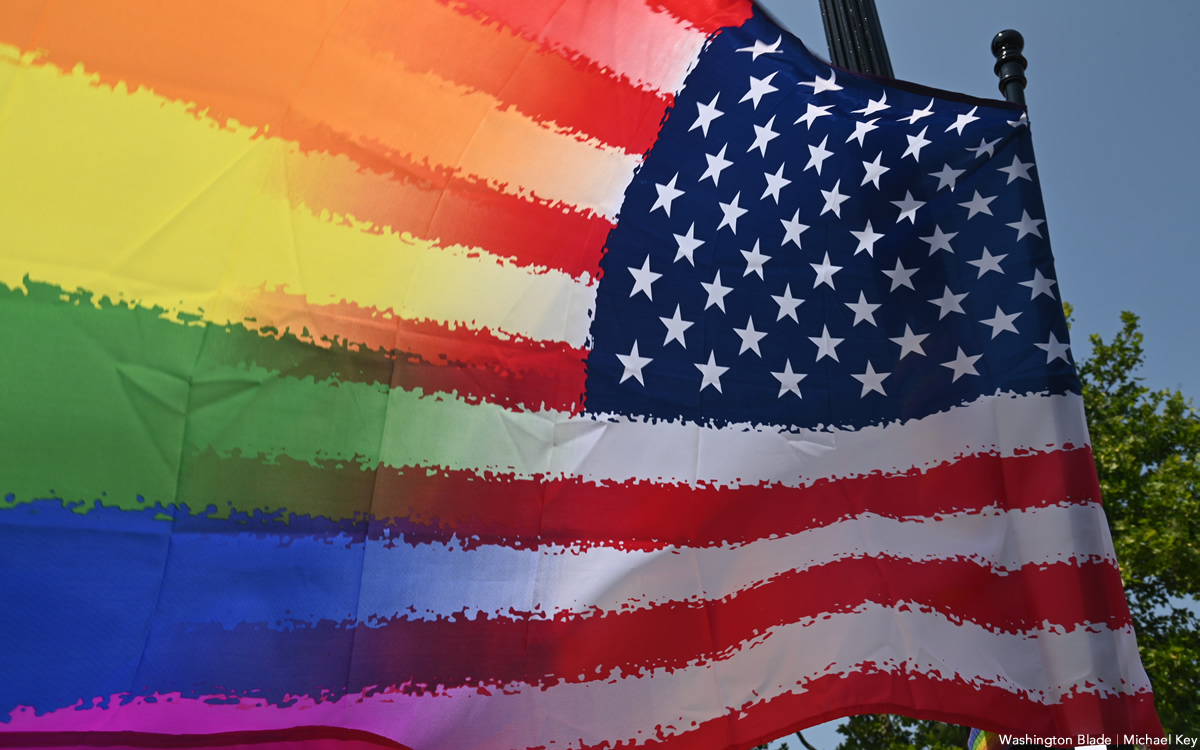
The Rainbow History Project will host “Pickets, Protests and Parade Exhibit Tour” at 7 p.m. at Freedom Plaza. This event honors the courage, resilience and resistance of D.C.’s gay community. For more details, visit Eventbrite.
Go Gay DC will host “LGBTQ Community Social” at 7 p.m. at Hyatt Centric Arlington (1325 Wilson Blvd.). This fun event is ideal for meeting new people and community building. Attendance is free and more details are available on Eventbrite.
Xavier Entertainment DC will host “Cowboy Carter Afterparty” at 10 p.m. at Nellie’s Sports Bar. There will be fireworks, parades, and patriotic fun. For more details, visit Eventbrite.
Mezcal Amaras will host “Sha Boing Boing Showdown” at 6 p.m. at Snappy’s Small Bar (3917 Georgia Ave., N.W.). Get ready to test your hotdog eating abilities. Tickets start at $12.51 and can be purchased on Eventbrite.
Illusions Drag Queen Show will host “Drag Queen Dinner Show” at 7 p.m. at 2323 18th St. N.W. Guests will be treated to the very best celebrity drag impersonations in entertainment. Tickets start at $12.97 and are available on Eventbrite.
Thurst Lounge will host “A Thirsty Cowboy Afterparty” at 5 p.m. DJ Apollo will be performing. For more details, visit Thurst’s website.
9:30 Club will host “Gimme Gimme Disco: A Dance Party Inspired by ABBA” at 9 p.m. The DJ will play plenty of disco hits from the 70s and 80s. Tickets cost $45.30 and can be purchased on Ticketmaster.





